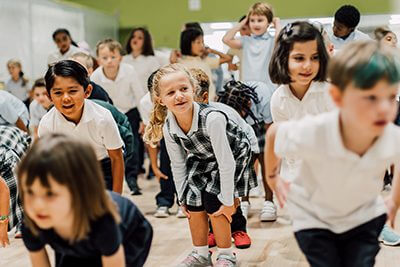October 10, 2019
 by Dr. Bill Hudson, Head of School
by Dr. Bill Hudson, Head of School
Although Mondays can often be tough, attending the Lower School Monday Morning Meeting is a great start for my week. This past Monday was no exception. As I walked into the new Family Commons, I was greeted by the music of Trombone Shorty and the entire Lower School dancing and practicing their body percussion moves for Grandparents and Special Friends Day. It was pure joy and much more effective in waking me up than the third or fourth cup of coffee I was drinking. It had the same effect on other adults in the building as many poked their heads into the Commons as they walked by, leaving with big smiles on their faces. There is something about music that can transform our mood and lift our spirits instantly.
In an era when many schools are cutting their music programs in favor of more time for STEM-related classes, you may wonder why MPA places so much emphasis on music. In Lower School, students have approximately 90 minutes of music class a week. All Middle School students have year-long music or choir, are required play an instrument, and have either band or orchestra. Upper School students are required to have three credits in the fine arts, which includes instrumental and vocal music.
True to our founding values, we honor our conviction that music enriches the life of our student body by nurturing the aesthetic spirit inherent in each student. Literacy in the arts develops an appreciation and understanding of artistic concepts particular to each discipline. We believe that authentic experiences as performers, musicians, and artists, are essential for each student to maximize their potential.
The advances of brain research did not exist at the time the school was founded, but I believe our founding teachers knew instinctively that music plays a vital role in the development of the brain. Today, we know conclusively that music enhances children’s cognitive abilities—particularly around inhibition, planning, and verbal intelligence. Researchers at the National Science Foundation have found that music is a key ingredient in the neurological roots of the creative process. It inspires higher brain functioning and improves cognitive outcomes.
Participation in music education has been linked to improved memory and focus; higher self-esteem; improved spatial reasoning abilities; and enhanced skills such as collaboration, empathy, critical thinking, and creativity. A 2012 study reported in the Journal of Neuroscience revealed that receiving formal music instruction as a child “leaves an imprint” on the adult brain, resulting in “more robust brainstem responses to sound.”
Music is also linked to creativity and innovation. I remember reading a study that found that early and sustained music education was the only commonality among Nobel laureates. It is also linked to the cultivation of essential 21st Century skills such as perseverance, collaboration, improvisation, communication, critical thinking, and empathy. Music can also be a gateway in developing cultural awareness and appreciation.
At MPA, we spend a great deal of time and effort sharing what we do and how. However, in the words of one of my favorite authors, Simon Sinek, what really matters is the why. The why of music education at MPA is intertwined with developing student’s aesthetic spirit, their appreciation of beauty, developing their intellect, along with the experiences and skills necessary to truly learn, live, and thrive.